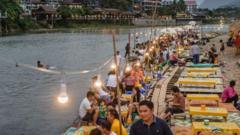Suspected methanol poisoning has claimed the lives of five tourists in Laotian hotspot Vang Vieng over a two-week period, highlighting severe concerns surrounding the safety of bootleg alcohol in Southeast Asia. Among the deceased are a British woman, an Australian woman, a US man, and two Danish nationals, while another Australian woman is reportedly in critical condition. Initial investigations suggest the victims may have consumed tainted drinks that contained methanol, a toxic substance commonly found in illicit alcoholic beverages.
Historically, methanol poisoning has been prevalent in Southeast Asia, particularly within poorer nations along the Mekong River. Despite warnings from foreign governments regarding alcohol consumption in these regions, tourists—especially backpackers—continue to be largely uninformed about the risks involved.
Methanol, a colorless and odorless alcoholic compound, can be lethal even in small quantities, with as little as 25 milliliters potentially causing death. Symptoms of methanol poisoning can take up to 24 hours to manifest, including nausea, vomiting, and abdominal pain, which may progress to severe respiratory issues. Medical authorities, including Médecins Sans Frontières (MSF), report that untreated cases can have fatality rates ranging from 20% to 40%, depending on variables like the quantity consumed and methanol concentration.
The high prevalence of methanol poisoning in Asia, particularly in impoverished countries such as Laos, Cambodia, Vietnam, and Indonesia, necessitates urgent attention. According to MSF data, Indonesia has been identified as a significant hotspot for these incidents over the last two decades due to rampant production and consumption of bootleg liquor.
Young backpacker-friendly towns like Vang Vieng thrive on tourism and hospitality, but insufficient law enforcement and a lack of stringent regulations expose visitors to unsafe drinking environments. Local producers often resort to creating counterfeit beverages, substituting methanol for ethanol to increase potency and cut costs. Observers note that the root issue lies in low levels of education and regulation within the alcohol production industry, rather than a deliberate intent to harm tourists.
Calls for action emphasize the need for widespread education regarding the dangers posed by bootleg alcohol. Tourism operators and governmental agencies are encouraged to launch high-profile campaigns to inform and protect travelers. Following the tragic events, several Western embassies have updated their travel advisories concerning alcohol safety in Southeast Asia and are urging tourists to exercise caution.
Vicissitudes in alcohol consumption have motivated campaigns like the ‘Don't Drink Spirits in Bali’ Facebook page, where users share warnings about potential methanol poisoning. However, experts acknowledge the challenge of enabling tourists to safeguard themselves without resorting to complete abstention from alcohol—an unrealistic expectation for many.
The deaths in Laos serve as a sobering reminder of underlying issues in the tourism sector regarding public safety and responsible consumption. As more tourists venture into these popular destinations, the consequences of ignoring the methanol crisis can be dire, and systemic changes are necessary to prevent further tragedies.






















